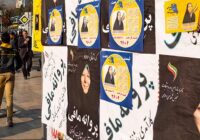What is behind Iran’s low ranking in the 2018 World Happiness Report?
Iranians are unhappy for a number of reasons, like in all countries where people are sometimes more and sometimes less happy. However, the root cause of unhappiness in Iranian society is of a different nature: It’s ideological.
There are different ways to measure and illustrate the extent of life satisfaction in different countries. International reports and indices are a good tool to gage why some nations are generally happier while others are less so. Iran is rich with natural resources and invaluable human capital but, at least according to the World Happiness Report 2018, it is a country where people do not smile effortlessly, ranked 106 out of 156 nations.
A study by Kuba Krys, a psychologist at the Polish Academy of Sciences, shows Iran is one of the countries where smiling is not necessarily a sign of warmth or even respect. In countries like Iran, India, South Korea and Russia, smiling faces are considered to be significantly less intelligent. There’s also a political connotation to the smile in Iran: Smiling diplomats, regardless of their qualifications and achievements, are considered by the conservative, traditionalist and nominally “republican,” less determined in safeguarding national interests. That is why Iran’s eloquent foreign minister, Javad Zarif, was frequently reprimanded by his hardliner and extremist critics for smiling more than necessary during the nuclear deal talks with the world powers, in which the diplomats of “enemy states” such as the United States and Britain also participated.
Iran’s problems, which are largely of its own making, can be solved. However, the lack of determination among those who have the power and authority to solve these problems, and who sometimes find themselves at odds with their constituencies, make Iran a special case. Those in power are at odds with their electoral base because nearly 40 years after Iran’s revolution, despite possessing the second largest natural gas reserves in the world and the fourth largest global oil reserves, Iran is still unable to ensure national prosperity. Instead, its ruling class has embraced backbreaking economic sanctions that have dilapidated the country’s economy, refusing to commit to good governance, integrity and honesty toward the people of Iran.
Iran’s economy is derelict, as the country’s nuclear program, regional ambitions and strained foreign relations have affected the trade, commercial and industrial sectors. Purchasing power parity per capita in Iran is $20,030 according to the International Monetary Fund, far below neighboring Turkey and countries like Mauritius and Equatorial Guinea. General unemployment rate is 12.1%, while the youth unemployment is at 28.4%. There were widespread protests across the country at the end of last year, fueled by public frustration about the economic woes of the nation, the inefficiency of the nuclear deal and the unmet demands of the youth and women.
All About Politics
Iran is an over-politicized country, in which almost everything is artificially linked to politics, where people debate sophisticated foreign and domestic policy issues as they queue at the bakery. But political obsessions of daily life aside, Iran is a society in which religion is introduced to many people, especially the youth, as a way to impose a multitude of restrictions on different aspects of their social life.
Iran’s Islamic Revolution of 1979 won hearts and minds with grand promises: national independence, no foreign involvement in the daily affairs or major political decision-making of the country, equal educational opportunities, a healthy and robust economy based on the values of “Islamic banking,” no Western objectification of women, creating new youth employment opportunities, freedom of speech and freedom of the press, as well as good relations with the Muslim world based on the principles of good governance. But how many of these promises have been realised 39 years after the revolution emerged victorious?
Daily conversations in Iran have the potential to stray into heated political debates questioning the reasons why the revolution took place, and how it has been successful in delivering on its promises. Aside from not being a happy and jovial nation, Iranians today lack many freedoms they were promised in 1979. They find themselves forced into accepting many compulsory things that were not part of the revolution’s agenda but have turned out to be its modus operandi and its essence.
Many women in Iran are not happy with the compulsory hijab, expressing their dissatisfaction in opinion polls, through open protest and on social media. Aside from Saudi Arabia, Iran is the only country in the world where an Islamic dress code is mandatory for women. When a government imposes its own choices on a large population and makes decisions on behalf of its women on something as everyday and personal as what one should wear, it’s innately alienating and ostracizing them, creating opponents for itself.
All men over the age of 18, after graduating from high school or university, must attend compulsory military service. While almost no Iranian boy or man would volunteer to be enlisted for conscription, they have no choice but to spend up to two years away from their family in the barracks; only then they will be issued a passport and a certificate of the completion of military service to be able to enjoy certain social services.
Press freedom has also long been compromised. Unluckily, Iran, which boasts of many brilliant young journalists and media professionals, is reputed to be one of the worst jailers of journalists in the world. In 2017, five journalists were imprisoned in Iran. The country deplorably ranks 164 out of 180 in the Reporters Without Borders 2018 World Press Freedom Index.
Which Way Now?
All of these problems have solutions — solutions not beyond the limits of the capacity of hundreds of educated, well-paid ministers and high-ranking government officials and members of parliament who can start thinking of alternative policies after years of trial and error following the revolution. Iran’s problems are not insoluble.
It is time for Iran and its leaders to stop thinking of this country as a separate entity from the rest of the world and stop using the words “international community” as a pejorative term. Iran should open its doors to the world. It should embrace reform by giving into some degree of secularism in education and stop treating journalists, environmental activists and academicians as criminals. Iran needs serious reform of its foreign policy, especially toward its Arab neighbors, the European Union and countries with which it doesn’t have diplomatic relations, such as the United States.
Just recently, the Canadian parliament said no to negotiations for restoring diplomatic ties with Iran, which spells more trouble for Tehran as it misses out on fomenting ties with powerful partners. Iran should be a country which doesn’t dream of “exporting its revolution” by force. Iranian leaders should stop rationalize economic and social injustice through the lens of religion. A more open, stable Iran can be a role model; otherwise, it will remain a pariah state suffering under sanctions and isolation.
The views expressed in this article are the author’s own and do not necessarily reflect Fair Observer’s editorial policy.
Photo Credit: Grigvovan / Shutterstock.com
Support Fair Observer
We rely on your support for our independence, diversity and quality.
For more than 10 years, Fair Observer has been free, fair and independent. No billionaire owns us, no advertisers control us. We are a reader-supported nonprofit. Unlike many other publications, we keep our content free for readers regardless of where they live or whether they can afford to pay. We have no paywalls and no ads.
In the post-truth era of fake news, echo chambers and filter bubbles, we publish a plurality of perspectives from around the world. Anyone can publish with us, but everyone goes through a rigorous editorial process. So, you get fact-checked, well-reasoned content instead of noise.
We publish 2,500+ voices from 90+ countries. We also conduct education and training programs
on subjects ranging from digital media and journalism to writing and critical thinking. This
doesn’t come cheap. Servers, editors, trainers and web developers cost
money.
Please consider supporting us on a regular basis as a recurring donor or a
sustaining member.
Will you support FO’s journalism?
We rely on your support for our independence, diversity and quality.





